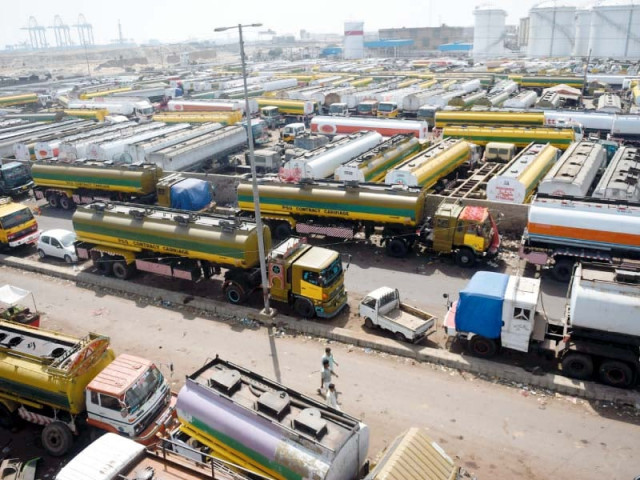Pakistan’s oil industry imports 20-25 shipments every month worth 15-25 billion. Rs.
Oil tankers parked at a terminal in a port in Karachi. PHOTO: AFP
The Oil Companies Advisory Council (OCAC) has raised the alarm over a potential fuel import crisis following the Sindh government’s demand for mandatory bank guarantees.
In an urgent letter to the Ministry of Energy and the Department of Petroleum, OCAC warned that if the problem remains unresolved, the importation of petroleum products may stop in the coming months.
The clearance of oil shipments at Karachi Port had been delayed due to the provincial government’s enforcement of a 1.8% Sindh Infrastructure Development Cess on Monday, raising fears of a nationwide fuel shortage.
The 1.8% cess is expected to increase the price of petroleum products by more than Rs3 per litre. Although fuel prices are regulated, the imposition of the tax will have a direct impact on consumers.
The threat of shortage of petroleum products was temporarily averted after the Sindh government cleared a Pakistan State Oil (PSO) vessel on a 15-day commitment.
The Sindh Excise Department later issued another urgent notice to the OMCs, directing them to furnish the required bank guarantees in lieu of undertaking. The department has stated that companies’ cases will only be dealt with once the guarantees have been received.
“The industry cannot be held responsible for any disruption to the supply chain should imports be affected,” the council warned, stressing that it has repeatedly called on successive governments to address the matter.
Read: Fuel shortage eases temporarily as Sindh clears PSO vessel
“This has been a long-standing problem of the industry which continues to recur at regular intervals without a solution and this office has repeatedly sent letters regarding the same to your good office. While the vires of SIDC remain pending before the Hon’ble Supreme Court of Pakistan, the Supreme Court has passed an interim order dated September 1, 2021, requiring the release of BG, the same (“Interim Order”),” the letter said.
The letter described immediate intervention by the Ministry of Energy as essential to ensure an uninterrupted fuel supply across the country.
Pakistan’s oil industry imports between 20 and 25 consignments every month, each consignment being between Rs 15 and 25 billion.
OCAC added that no company in the sector has the financial capacity to provide bank guarantees of such magnitude.
Fear of lack
The Oil Companies Advisory Council (OCAC) had earlier written to Sindh Chief Minister Murad Ali Shah to raise alarm over the situation. According to OCAC, oil cargoes currently being unloaded along with ships anchored in ports require immediate customs clearance.
The letter stated that PSO’s oil tankers – MT Islam 2 and MT Hanifa – are at berth awaiting clearance. It added that oil stocks at the Keamari terminal are running low and that the two vessels at the Karachi Port Trust (KPT) must be granted customs clearance without delay.
Read more: Nationwide fuel shortages feared as Sindh imposes infrastructure cess on oil imports
“Only after customs clearance can the continuity of the oil supply chain across the country be ensured,” OCAC warned.
The Oil Marketing Association of Pakistan (OMAP) also warned that the 1.85% infrastructure development certificate and mandatory bank guarantee requirements could disrupt oil imports across the country.
OMAP Chairman Tariq Wazir Ali warned that the Sindh government’s new policy poses a “serious threat” to the national petroleum supply chain. He warned that unless the bank guarantee is withdrawn, Pakistan’s oil imports could face severe disruption, potentially leading to shortages of petrol and diesel across the country.
“This issue needs urgent attention,” Ali stressed. “If timely action is not taken, the country may face a severe shortage of fuel, affecting both the economy and industry,” he added.



